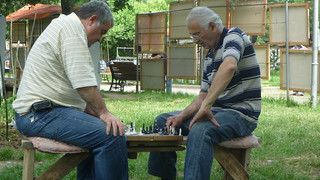 Almost a year since my first visit to the Republic of Georgia, I am back in Tbilisi, working here for one week. And while last year many of my conversations and observations were related to conflicts and recent history, this year I’m going beyond the surface and learning about the many layers Georgia today. What strikes me, more anything else, is that no matter who I speak with, there is a flat out – lack of hope in this country.
Almost a year since my first visit to the Republic of Georgia, I am back in Tbilisi, working here for one week. And while last year many of my conversations and observations were related to conflicts and recent history, this year I’m going beyond the surface and learning about the many layers Georgia today. What strikes me, more anything else, is that no matter who I speak with, there is a flat out – lack of hope in this country.
It isn’t the first county I’ve ever experienced with no hope for the future, back in my Portugal people are also routinely negative and resigned that nothing good will happen in the future. Like the Portuguese, Georgians have plenty of reasons to justify this outlook: Georgia doesn’t make anything the world seems to want, the average mentality does not seem to have changed much over the past 20 years, and there is good evidence that current and future leadership has neither the capability or intention to do something about the mounting issues.
Despite all the despair, present and future, here we are. Countries like Georgia, where few believe anything will progress for the better in their lifetime, ramble on. Sure, I could point out the shiny new yellow mini buses found all over town, the vast amount of young people who have a global outlook and talent for languages (among other skills), or how police corruption seems to have faded when taking into account stories from the past involving bribery and illegal incarceration. I suppose none of these factors can make up for all the things that aren’t working and aren’t getting better around here.
Talking about hope is considered a lame and worthless line of conversation for many people. Back in 2008 it was a big group of Americans who decided to believe in change and hope. Now you can’t even say the words. Here in Georgia, though there’s no Obama, don’t bother mentioning hope, you’ll just sound silly.
 I had to read the sentence a few times out loud to friends in order to understand if I was getting it wrong:
I had to read the sentence a few times out loud to friends in order to understand if I was getting it wrong: 


 I can remember at the end of every summer when I was kid, having to wake up before the sun came up, to get a ride from the town’s lone taxi driver, who would take us on the long journey via the treacherous and twisty national roads of Portugal before the dawn of highways, to catch the plane back to New Jersey. Right before my brother and I would get in the car, my grandparents would do the routine: wish us a good trip and ask us if we forgot anything. Then my grandmother, who even back then never had trouble speaking her mind, would speak a dramatic line like she was rehearsing for a very poor rendition of McBeth, “I probably won’t see you next year, as I’m old and I probably won’t survive til next summer.” This would be followed by us half-laughing at her over-dramatic delivery as we’re trying to focus on the journey ahead, and the traditional, “oh be quiet with that stuff” from my grandfather. More than 20 years later, I’ve noticed my grandmother no longer says it, as I guess around the age of 90 it is simply implied.
I can remember at the end of every summer when I was kid, having to wake up before the sun came up, to get a ride from the town’s lone taxi driver, who would take us on the long journey via the treacherous and twisty national roads of Portugal before the dawn of highways, to catch the plane back to New Jersey. Right before my brother and I would get in the car, my grandparents would do the routine: wish us a good trip and ask us if we forgot anything. Then my grandmother, who even back then never had trouble speaking her mind, would speak a dramatic line like she was rehearsing for a very poor rendition of McBeth, “I probably won’t see you next year, as I’m old and I probably won’t survive til next summer.” This would be followed by us half-laughing at her over-dramatic delivery as we’re trying to focus on the journey ahead, and the traditional, “oh be quiet with that stuff” from my grandfather. More than 20 years later, I’ve noticed my grandmother no longer says it, as I guess around the age of 90 it is simply implied.